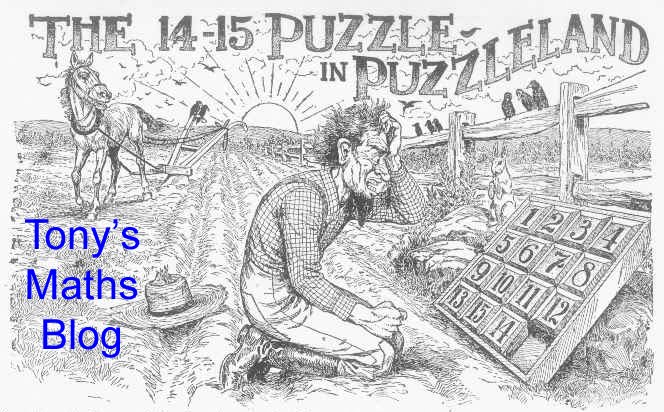One of the happy outcomes from the recent MathsJam conference (See my previous post) was that I was able to get my copies of two recent maths books signed by their authors. (It would have been three had my copy of Matemagia not already been signed.) One was Problems for Metagrobologists by the mathematical puzzles expert David Singmaster. This is a collection of mathematical puzzles, with a lot of fascinating insights and historical comments. (I'm not convinced David's title will maximise sales of this excellent book: using a word which many of your target audience may not understand is probably not the most effective marketing technique.)
I was interested in Singmaster's discussion of his puzzle 196 ("Not so likely"). He quotes a 1977 magic book which indicates a good bet - you ask your dupe to cut a pack of cards into three and bet even money that there is an Ace, a Two or a Jack at the bottom of one of the piles. Apparently the original author indicates that there is about a two-thirds probability that you will win - Singmaster not only asks you whether this is right (it isn't!) but also invites you to speculate on how the author went wrong.
I was interested because I had recently acquired a 1964 book on mathematical magic, and had opened it at exactly the same problem (well, in this case the winning cards are an Ace, a Four and a Jack). But this author (whose blushes I will spare by not naming him) gives a different answer, albeit also wrong. This book indicates that the chance of winning is 36 in 52, There are twelve ways the bottom card of the first pile can win, twelve winning cards for the bottom card of the second pile, and twelve for the third pile: a total of 36. I will leave the reader to identify the fallacy in this argument.
The author goes on to say that, of one cut the deck into four piles, one would have an overwhelming 48 in 52 chance of winning. (Did he try it? It wouldn't take too many attempts to cast doubt on that claim.)
I find it astonishing that the author didn't go one step further, and comment that if one divided the deck into five piles, one would have 60 chances of winning out of 52. At that point it becomes clear that something is very wrong with the argument.
So why didn't the author take that step, and see that he had made an error? Did he do so, realise there was a problem, and give up, hoping his readers wouldn't notice? Did the author really believe his answers? Is the whole thing some sort of joke? Probability is a difficult subject and it is easy to go wrong. But this author is not only well-read but also well-connected (he thanks Martin Gardner for advice in his introduction). Could he really be unaware that he had got this example so badly wrong? Whereas Singmaster in his book gives a plausible guess as to how his author arrived at his erroneous two-thirds figure, I find it puzzling that my author didn't carry his argument that one step further and see that he had gone wrong.
I'm not quite sure what moral to draw from this!
Tuesday 29 November 2016
Tuesday 15 November 2016
The impossibility of blogging about MathsJam
I thought I would do a blog post on the MathsJam weekend conference which I have just attended. This was two days of short (five-minute maximum) talks about interesting maths, delivered by a wide variety of speakers. Although by definition anything presented at MathsJam is recreational, topics varied from very pure mathematics to very applied, with statistics, operational research, computing and communication all included (and also art and poetry). I think I say this every year, but 2016 was the best MathsJam yet.
My plan for this blog post was to describe three or four highlights and ideas I had taken away. But after a quick look at my notes I find that that would be impossible, There were too many highlights to mention: no small selection could be fair. So all I'm going to do is refer readers to the website which, we are promised, will in due course make the presentations available, and thank the organisers and participants for providing such an amazing, inspiring, friendly weekend.
My plan for this blog post was to describe three or four highlights and ideas I had taken away. But after a quick look at my notes I find that that would be impossible, There were too many highlights to mention: no small selection could be fair. So all I'm going to do is refer readers to the website which, we are promised, will in due course make the presentations available, and thank the organisers and participants for providing such an amazing, inspiring, friendly weekend.
Subscribe to:
Posts (Atom)
